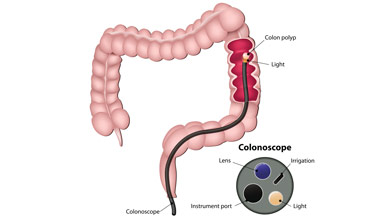Colorectal Cancer Answers from a Johns Hopkins Surgeon
Featured Expert:
Colorectal cancer (cancer of the colon and rectum) is the second leading cause of cancer death in the United States, claiming the lives of approximately 56,000 people each year. Learn more about prevention, screening and treatment options with expert answers from Johns Hopkins colorectal surgeon Dr. Peter Najjar.
What are the symptoms of colorectal cancer?
Unfortunately, there typically aren’t any symptoms until the disease progresses. If they do appear, colon and rectal cancer symptoms can include:
- Blood in the stool, which may not be visible to the naked eye
- Anemia
- Abdominal discomfort
- Nausea and vomiting
- Pelvic pain
- Weight loss
- Change in bowel habits (e.g., unusual diarrhea and/or constipation , thinner-appearing stool)
If my doctor finds signs of colorectal cancer during my colonoscopy, how can surgery help?
Surgery is often the first line of treatment against colorectal cancer.
If the cancer is caught early enough, patients can often be treated with surgery alone — without having to undergo radiation or chemotherapy. That’s why it’s so important to talk to your doctor about colorectal cancer screening.
Another advantage of surgery is that, if needed, doctors can deliver radiation during the operation. This makes it easier to target the cancer and keep radiation away from other parts of your body.
Colorectal Surgery at Johns Hopkins

The Johns Hopkins Colorectal Surgery Division provides comprehensive treatment for all anal, colon and rectal diseases. We collaborate with healthcare providers across different specialties to provide you the best care.
What types of minimally invasive surgery options are available for colon and rectal cancer?
There are several options to provide patients with good outcomes and easy recoveries.
- Laparoscopic surgery: With this approach, a tiny camera and surgical tools are inserted through small incisions to remove the cancer.
- Robotic surgery: Robotic instruments offer more freedom so that a surgeon can operate with ease. For laparoscopy, the instruments are straight and may limit access to certain structures. Both robotic and laparoscopic incisions are minimally invasive.
- Transanal minimally invasive surgery: This technique allows surgeons to operate through the anus to remove large, noncancerous rectal tumors and, in a select number of cases, early rectal cancers.
Depending on how far the cancer has spread, your surgeon may need to remove parts of your digestive tract, including the anus and rectum. If you fit into that category, groundbreaking reconstructive methods are available to optimize your quality of life following the procedure.
How can I prevent colorectal cancer?
Colorectal cancer occurs when the cells that line the colon become abnormal, most often through the growth of a polyp. These polyps, if left untreated, can transform into cancer.
Early detection is vital for prevention of colorectal cancer, and screening should be a part of routine care. A colonoscopy can detect and remove any polyps, preventing something more serious from developing in the future.
Can diet affect my colorectal cancer risk?
What you eat can influence your risk. Whenever possible, try to limit the amount of processed or red meat you consume. Research has found that certain chemicals and preservatives in these meats can contribute to colorectal cancer — especially if eaten often.
Instead, fill your plate with fruits, vegetables, fish and whole grains. These foods can reduce your risk of developing cancer.
Colorectal Cancer Patient Care and Research Center of Excellence

The Colorectal Cancer Center at the Johns Hopkins Kimmel Cancer Center uses a multidisciplinary approach to deliver the latest treatment advances in precision medicine.







